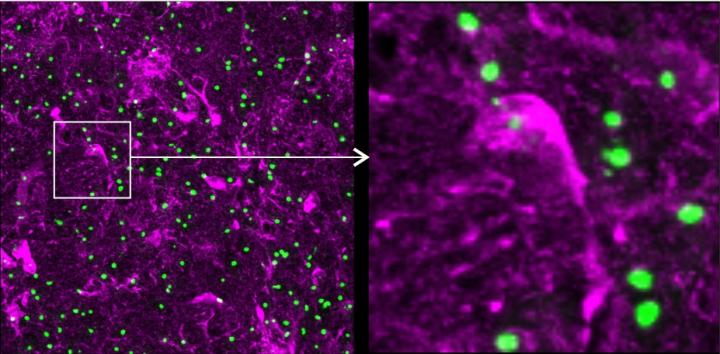October 16, 2019 -- A new study led by researchers at UCLA published in Science Translational Medicine on October 16 found that Huntington's disease (HD) damages astrocytes at the early stages of the disease, contributing to neuropsychiatric symptoms.
Huntington's disease is a progressive neurodegenerative disorder characterized by motor, cognitive, and psychiatric symptoms. It is caused by an autosomal dominant mutation in the huntingtin (HHT) gene. The average age of onset is around 45 years of age. HD primarily affects the CNS and in particular, the striatum and cortico-striatal-thalamic circuitry. HHT mutations in astrocytes leads to phenotypes related to HD. Astrocytes are cells that closely contact neurons and blood vessels and are widely implicated in central nervous systems (CNS) disorders. Astrocytes are of broad interest in exploiting their ability to modulate the mechanisms that drive neurodegeneration.

"It's likely that we will not understand brain diseases without also understanding what happens to the cells that actually form the brain, including astrocytes," said Baljit Khakh, the study's lead investigator and a professor of physiology and neurobiology at the David Geffen School of Medicine at UCLA.
Using GFAP immunohistochemistry, RNA sequencing, and qPCR experiments, the researchers observed protein levels and gene expression at three stages of disease. They tracked progression of HD in the brains of deceased humans and in living mice that carry the gene mutation. The researchers found a core set of gene expression changes conserved across different HD models, at the level of RNA and protein.
They confirmed that the altered function of mutated astrocytes was comprised of signaling pathways and neurotransmitter regulation. They found that by suppressing the mutation in astrocytes, they were able to stop the disease progression in mice and repair some of the damage that can be seen when examining the cells closely. This is the first study to begin to identify how the HD mutation affects astrocytes, and more work is needed to fully understand the underlying mechanisms at work in the disease.
"We believe that if we are able to stop the progression of the disease in astrocytes and neurons, then we may be able to restore activity in the brain to what it was before the disease developed," Khakh said.
The study also established a database that can be used for future research on astrocytes in neurodegenerative diseases. The authors hope that this work will add to a growing body of work that suggests astrocytes play a role in neurological diseases such as Huntington's, ALS, multiple sclerosis, and Alzheimer's.
-
Limitations of the study include: in vivo testing and additional human HD tissue testing is needed: the study was restricted to the striatum: further testing of genetic modifications using ZFPs is needed in neurons to determine cell-specific contributions.
Do you have a unique perspective on your research related to neuroscience? Contact the editor today to learn more.
Copyright © 2019 scienceboard.net






